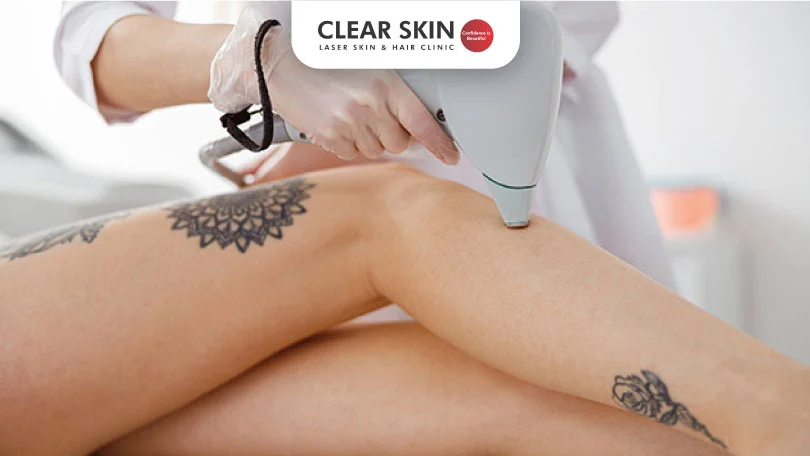Can Laser Hair Removal Damage Your Tattoo?

Written by Clear Skin Content Team | Medically Reviewed by Dr. Dhanraj Chavan on October 17, 2024

There is an important consideration: How does laser hair removal interact with tattooed skin? This guide provides a detailed look at the science behind laser technology, including how it targets hair follicles with concentrated light to inhibit future growth. It also covers the types of lasers used, such as diode and Nd: YAG lasers, and their effects on different skin types and tattoo colours.
Table Of Content
- Laser Hair Removal and Tattoos: An In-Depth Guide
- The Science of Laser Hair Removal
- Types of Lasers and Their Interaction with Tattoos
- How Skin Type and Tattoo Color Affect Laser Treatment
- Safety Tips for Laser Hair Removal on Tattooed Skin
- Alternative Hair Removal Options for Tattooed Skin
- Conclusion
Laser Hair Removal and Tattoos: An In-Depth Guide
Laser hair removal is an increasingly popular cosmetic procedure for those seeking a long-term solution to unwanted hair. It offers the convenience of reducing the need for traditional hair removal methods like shaving, waxing, or plucking.
However, for individuals with tattoos, there is an important consideration: How does laser hair removal interact with tattooed skin? This guide provides a detailed look at the science behind laser technology, including how it targets hair follicles with concentrated light to inhibit future growth. It also covers the types of lasers used, such as diode and Nd: YAG lasers, and their effects on different skin types and tattoo colours.
Understanding the interaction between laser wavelengths and tattoo pigments is crucial for ensuring safety and effectiveness. Additionally, the guide offers safety tips to protect tattooed areas during laser hair removal sessions and explores alternative hair removal methods for tattooed skin, such as electrolysis or specialized creams, to ensure a comprehensive approach to hair management.
The Science of Laser Hair Removal
Laser hair removal operates by directing concentrated light beams at hair follicles. These beams are absorbed by the melanin (pigment) in the hair, converting light energy into heat. The heat generated damages the hair follicles, which inhibits future growth and leads to a reduction in hair over time.
This process is highly effective because melanin specifically absorbs certain wavelengths of light, allowing for precise targeting of hair follicles without causing damage to the surrounding skin tissue. The procedure typically requires multiple sessions to achieve optimal results, as hair grows in cycles and only follicles in the active growth phase are affected during each treatment.
Additionally, advancements in laser technology have made it suitable for a wide range of skin tones and hair types, increasing accessibility for more individuals seeking long-term hair reduction.
Types of Lasers and Their Interaction with Tattoos
There are several types of lasers used in hair removal, each with unique characteristics:
- Alexandrite Laser: Best suited for light to olive skin tones. It has a relatively short wavelength, making it less ideal for darker skin types.
- Diode Laser: Suitable for a wide range of skin types, particularly effective on light to medium skin tones.
- Nd:YAG Laser: Has a longer wavelength, making it safer for darker skin tones and less likely to affect tattoos, though care is still required.
- Ruby Laser: The oldest laser type, effective for very light skin tones, but less commonly used due to advancements in newer technologies.
Tattoos, composed of various ink pigments, interact differently with these lasers. Darker inks, like black, absorb more light and are more susceptible to laser energy, potentially leading to fading or damage.
How Skin Type and Tattoo Color Affect Laser Treatment
Skin Type
The Fitzpatrick scale is a widely used classification system for determining skin types based on their response to UV light exposure. This scale ranges from Type I, which burns easily and tans minimally, to Type VI, which rarely burns and tans deeply. Lighter skin types (Types I-III) generally respond more predictably to laser treatment due to their lower melanin content, which allows the laser to target pigmentation with minimal risk. In contrast, darker skin types (Types IV-VI) have higher melanin levels, requiring careful consideration and expertise during laser treatment to avoid risks such as hyperpigmentation or hypopigmentation.
Tattoo Color
The color of a tattoo significantly affects its response to laser treatment. Darker tattoo colors, such as black or dark blue, absorb more laser energy, which often leads to more effective fading but also increases the risk of skin damage if not properly managed. Lighter colors like yellow, green, or white absorb less laser energy, making them more challenging to remove and often requiring additional sessions or specialized laser wavelengths to achieve the desired outcome while minimizing potential side effects.
Safety Tips for Laser Hair Removal on Tattooed Skin
- Consult a Dermatologist: Always seek advice from an experienced dermatologist in laser treatments. They can provide personalized guidance based on your skin and tattoo characteristics.
- Patch Testing: Before full treatment, a patch test can help assess how your tattooed skin reacts to the laser, minimizing the risk of adverse effects.
- Adjust Laser Parameters: A skilled practitioner can adjust laser settings to minimize risks, though this may require additional sessions for effective hair removal.
- Avoid Direct Treatment on Tattoos: Lasers are often not applied directly to tattooed areas to prevent damage. Instead, hair removal may be done around the tattoo.
Alternative Hair Removal Options for Tattooed Skin
Electrolysis: A method involving electrical currents to destroy hair follicles, suitable for small areas and all skin types. It does not interact with tattoo pigments.Depilatory Creams: Chemical-based creams dissolve hair at the skin’s surface. While safe for tattoos, caution is advised to avoid skin irritation.- Waxing and Threading: These physical methods remove hair from the root and are safe for tattooed skin, though they can be painful and require regular maintenance.
Do You Know?
Roughly 250 Patients Are Treated
Everyday By These Dermatologists
(You are one click away from flawless skin)
Meet Our Dermatologist!
Conclusion
Navigating laser hair removal with tattoos requires careful consideration and professional guidance. Prioritizing safety ensures not only the preservation of your tattoos but also the health of your skin. For personalized advice, consulting with experienced dermatologists at Clear Skin Clinics, Pune can provide clarity and confidence in your hair removal journey.
Remember, informed and cautious decisions lead to the best results in skincare treatments. Stay informed and take care!
Further Reading
IV Drip Therapy in Pune & PCMC: How It Works
Discover how to combat dry skin acne & achieve radiant skin. Expert skincare tips to hydrate & prevent breakouts. Visit Clear Skin Clinics Pune for solutions.
Dry Skin and Acne
Discover how to combat dry skin acne & achieve radiant skin. Expert skincare tips to hydrate & prevent breakouts. Visit Clear Skin Clinics Pune for solutions.
Why Acne Comes Back After Stopping Treatment? – Pune Insights
Discover why 20-50% of acne patients experience relapse after stopping treatment. Learn about hormonal factors, Pune’s monsoon impact, maintenance therapy importance, and Clear Skin Clinic’s proven prevention strategies.”,
Pune Acne Treatment Costs – What to Expect in 2026?
Complete guide to acne treatment costs in Pune 2026. Transparent pricing for chemical peels, laser treatment, and isotretinoin at Clear Skin Clinic
Have thoughts? Please let us know
We are committed not only to treating you, but also educating you.





